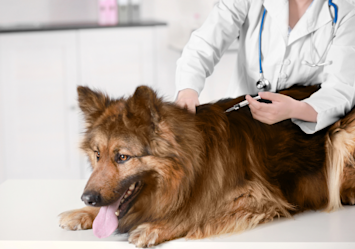
Our dogs are more than just pets. They are our furry family members. They are there for us through thick and thin. They make us laugh, they make us cry, and they love us unconditionally. That's why we do everything we can to keep them healthy and safe. One of the best ways to protect your dog from disease is to get them vaccinated.
As a pet parent, you want to protect your furry family member while being mindful of your budget. When it comes to the Bordetella vaccine – commonly known as the kennel cough vaccine – understanding the costs involved helps you make informed decisions about your dog's healthcare.
Whether you're a new puppy parent or maintaining your adult dog's vaccination schedule, this comprehensive guide will break down everything you need to know about Bordetella vaccine costs and options.
Why is the Bordetella Vaccine Important?
The Bordetella vaccine protects against kennel cough, a highly contagious respiratory infection caused by Bordetella bronchiseptica. While it’s considered a lifestyle vaccine, it is often required for dogs in boarding facilities, daycare centers, or training classes, even dogs who visit dog parks or groomers benefit from this protection.
Kennel cough spreads easily through droplets in the air or on shared surfaces, and while the vaccine doesn't guarantee complete immunity, it significantly reduces the severity of symptoms and helps your dog recover faster.
How the Bordetella Vaccine Protects Your Pet
Think of the Bordetella vaccine as a training program for your dog's immune system. Just like you might practice fire drills before a real emergency, this vaccine teaches your dog's body how to fight off kennel cough before actual exposure happens. When vaccinated, your dog may still catch kennel cough, but their body is better prepared to fight it off, leading to milder symptoms and faster recovery.
Some dogs need this vaccine's protection more than others, including puppies still learning to fight infections, senior dogs with weaker immune systems, and dogs with existing health conditions. Your vet can help choose the right form of the vaccine (injectable, nose drops, or oral) based on your dog's specific needs, ensuring they get the most effective protection against kennel cough.
How Much Does the Bordetella Vaccine Cost?
The Bordetella vaccine cost typically ranges from $15 to $45. However, the total expense depends on factors such as location, type of vaccine, and additional veterinary fees. Here's a detailed breakdown of what you can expect to pay:
Base Cost of the Bordetella Vaccine
The average cost for a Bordetella vaccine ranges from $15 to $45, with most pet owners paying around $30. This base price can vary depending on your location and choice of vaccine type.
Additional Fees to Consider
When budgeting for your dog’s Bordetella vaccine, remember that most veterinary clinics charge additional fees. These include:
Veterinary Exam Fee: Initial exams can range from $20 to $50, while follow-up visits may cost between $0 and $25.
Medical Record Setup: Some clinics may charge a small fee, typically $0 to $15, for new patients.
Altogether, the total cost for a visit—including the vaccine and any additional fees—can range from $35 to $95.
How Location Affects Vaccine Prices
Where you live significantly impacts vaccine costs. For example:
Urban Areas: Cities like New York or Los Angeles often charge higher fees due to elevated living costs.
Affordable Regions: Clinics in the Midwest or rural areas tend to offer more budget-friendly pricing.
Here’s a regional guide to Bordetella vaccine prices:
Northeast (NY, MA, CT): $30–$40
Southeast (FL, GA, NC): $25–$35
West Coast (CA, OR, WA): $30–$45
Midwest (IL, OH, MI): $25–$35
Southwest (TX, AZ, NV): $25–$35
If you're in a high-cost area, explore mobile vaccine clinics, community wellness events, or animal shelters for more affordable options.
Factors That Influence Bordetella Vaccine Costs
Several variables can affect the final price of vaccinating your dog:
Type of Vaccine: Oral and intranasal options may be slightly more expensive than the injectable version, but all are equally effective.
Veterinary Clinic Fees: Full-service veterinary clinics often have higher fees compared to low-cost clinics or mobile vaccine services.
Pet’s Health History: In some cases, your dog may require additional services (e.g., health screenings) that add to the overall cost.

Where to Find Affordable Bordetella Vaccines
Quality Bordetella vaccines don't always require premium prices. While full-service veterinary clinics offer comprehensive care, manufacturer guarantees, and expert support, they typically charge more than alternative options.
For budget-conscious pet parents, low-cost vaccine clinics, including mobile services and community wellness events, often provide savings of 30-50% compared to traditional vet visits.
Pet store vaccination events and feed store clinics present another economical choice, typically charging 30-40% less than full-service veterinary offices. However, remember that manufacturer guarantees usually only apply to veterinary-administered vaccines, and proper documentation is essential for boarding and grooming requirements.
To maximize savings without compromising quality, consider bundling vaccines during annual check-ups, watching for community clinic events, or exploring wellness plans that include vaccination coverage. Many animal shelters and nonprofit organizations also offer reduced-rate vaccines while maintaining professional veterinary oversight.
Bordetella Vaccine Schedule Guide
The Bordetella vaccine schedule varies based on your dog's lifestyle and risk level. For average-risk dogs who occasionally visit groomers or boarding facilities, annual vaccination provides sufficient protection. Dogs with frequent social exposure may need boosters every 6 months.
Timing and Protection
Your dog's first Bordetella vaccine can be given as early as 3 weeks of age. Protection begins quickly with intranasal or oral vaccines (72 hours) while injectable forms take 7-14 days to provide immunity. Many boarding facilities and groomers require vaccination within the previous 6-12 months.
Schedule by Risk Level
Average Risk: Annual boosters
High Risk: Every 6 months
Puppies: Starting at 3 weeks
Pre-boarding: At least 2 weeks before stay
This vaccine's flexible timing allows it to be easily incorporated into your dog's regular preventive care schedule, often administered during routine check-ups.
Bordetella Vaccine Safety and Side Effects
The Bordetella vaccine has a strong safety record with millions of doses administered annually. Most dogs tolerate the vaccine well, though mild reactions can occur based on the administration method.
What to Expect After Vaccination
Intranasal Application: Occasional sneezing or coughing with a mild nasal discharge (resolves in 48 hours).
Oral Administration: Temporary drooling or gagging with a brief loss of appetite (subsides within 24 hours).
Injectable Form: Slight tenderness or swelling at the injection site (resolves within 1-2 days).
While serious reactions are extremely rare, contact your veterinarian if your dog experiences severe symptoms such as lethargy, facial swelling, or difficulty breathing after vaccination.
How Much Do Complete Puppy Shots Cost?
Vaccinating your puppy involves more than just the Bordetella vaccine. A full series of puppy shots ensures your pup is protected against multiple diseases, with costs ranging from $200 to $400 per visit, depending on location and provider. Puppies typically require 3 to 5 visits during their first year, bringing the total cost of vaccinations to between $600 and $2,000.
Cost Breakdown and Factors to Consider
Each vaccination visit may include core vaccines like distemper, parvovirus, adenovirus, and rabies, as well as optional vaccines such as Bordetella. The specific costs can vary based on your veterinarian’s pricing, the type of vaccines used, and your region.
If your puppy has an established relationship with a veterinarian and is up to date on general health checks, some clinics may offer Bordetella vaccines through a nurse or technician visit, which could lower costs. Otherwise, a routine veterinary appointment may be required to administer the vaccine.
Managing Bordetella Vaccination Costs with Pet Insurance and Wellness Plan
Vaccinating your dog against Bordetella is not just about protecting their health—it’s a smart financial move. Treating a Bordetella infection, especially in severe cases requiring antibiotics or hospitalization, can cost anywhere from $200 to over $1,000, while the vaccine typically costs only $15 to $45. This small investment can save you from significant expenses and stress, making prevention the clear winner.
Choose protection for vet bills that also offers an optional, non-insurance Wellness Rewards plan that can help manage these costs by reimbursing for routine care, including Bordetella vaccines, wellness exams, and other preventive services.
Pairing a wellness plan with pet insurance ensures you’re covered for both expected expenses, like annual vaccines, and unexpected ones, such as complications from Bordetella or other illnesses. By planning ahead, you can protect your pet’s health and your wallet without breaking a sweat.
Tips for a Successful Vet Visit
A stress-free veterinary visit can make all the difference for your pet’s health and your peace of mind. If your dog gets nervous, positive reinforcement with their favorite treats and a calm, relaxed trip to the vet can help ease their anxiety.
For pets that get extremely stressed, consider talking to your veterinarian about anti-anxiety options. To maximize the value of your visit, try to schedule the Bordetella vaccine during regular check-ups, ask about multi-vaccine discounts, and ensure all vaccine records are up to date to avoid unnecessary revaccinations.
Why Vaccinate for Bordetella Disease?
The Bordetella vaccine represents a modest investment that pays significant dividends in your dog's health. At $15-45 per dose, this preventive measure costs far less than treating an active kennel cough infection, which can run hundreds or even thousands of dollars. Whether you choose a traditional veterinary clinic, low-cost community event, or pet store vaccination service, protecting your dog from this common respiratory infection is both affordable and essential.
Remember that keeping your pet healthy doesn't have to strain your finances. From timing vaccines during routine check-ups to exploring wellness plans and pet insurance options, there are multiple ways to manage preventive care costs while ensuring your furry family member stays protected. After all, a happy, healthy pet means more joyful moments together – and that's truly priceless.
Frequently Asked Questions About the Bordetella Vaccine
How much does a Bordetella vaccine (kennel cough shot) cost?
The Bordetella vaccine price typically ranges from $15-45 per shot. Total cost including exam fees can reach $35-95, depending on your location and provider choice.
What's the cost of complete puppy shots?
Full puppy vaccination packages, including the Bordetella shot, cost $200-400 per visit. Expect 3-5 visits in the first year for complete protection.
Do prices vary by vaccine type and provider?
Yes, costs vary based on the form (intranasal, oral, or injectable) and where you get it. Traditional vet clinics typically charge more than mobile clinics or community events.
Do I need an appointment for a Bordetella vaccination?
Most veterinary clinics require appointments, while mobile and pop-up clinics often accept walk-ins. Always bring your pet's medical records.
How often does my dog need the Bordetella vaccine?
Protection lasts 6-12 months. High-risk dogs need shots every 6 months, while annual boosters suffice for average-risk dogs.
Can cats get Bordetella vaccines?
Yes, specific vaccines exist for cats, who can develop similar respiratory symptoms and may need protection.
My pet gets nervous at the vet. What can I do?
Bring favorite treats and keep the experience positive. For very anxious pets, discuss anti-anxiety options with your vet.
Does pet insurance cover shots and vaccines?
Most standard pet insurance plans don't cover routine vaccinations, but many companies offer optional wellness plans that can help cover vaccine costs and other preventive care.